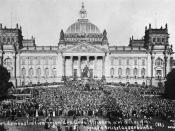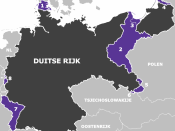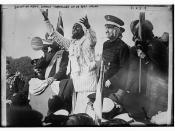Throughout the period 1918 to 1945, the Army was impacted both positively and negatively through the implementation of Nazism. Between the end of the First World War and the implications placed upon Germany under the signing of the Treaty of Versailles, the Army undertook significant restructure. Throughout both the National Socialist German Labour Party, known as the Nazi Party, and leader Adolf Hitler's rise to power, Hitler deliberately targeted the support of the Army in order to gain power the only way he thought was fit, by legal means. The re-Establishment of a German Army that was internationally competitive is an example of Nazism directly impacting the Army. Hitler needed rearmament of the German Army in order to achieve his goal Lebensraum (living space) for the German people. Finally, throughout World War II, the Army became a dictator of Nazism through the invasion of countries in order to achieve Lebensraum and the contribution towards Hitler's 'Final Solution', or extermination of the Jews.
The surrender of the German Imperial Force on the 11th of November 1918, German soldiers were expected to return to their homeland after 4 years of treacherous war and assimilate back into German society. Feeling out of place, most returning soldiers joined right-winged, anti-Weimar constitution and military oriented political parties. Examples include the Friekorps who were "anti-communist volunteer groups formed by demobilised who were "anti-communist volunteer groups formed by demobilised servicemen. Part of the roles of these servicemen was to end revolutionary activity throughout German society, mainly communists, as requested by the Weimar Republic. One of the major feats of the Friekorps involved the ending of the Spartacist Uprising of the 5th of January and ending on the 15th of January 1919. The signing of the Treaty of Versailles on the 28th of June 1919 signified the...


